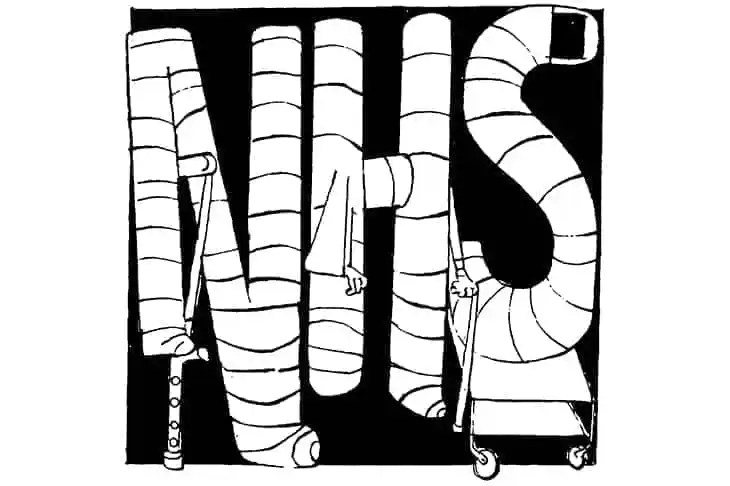British political discourse has barely progressed since David Cameron told voters in 2010 that he represented the ‘party of’ our revered healthcare service.
Over the past few weeks we’ve heard pledges – all clearly with an election in mind – ranging from the inconsequential to the ridiculous. Tired promises about community-led treatment. Receptionists-turned-‘care navigators’. School leavers working as doctors. But more often than not, they have been laced with the same pernicious message: that it is the behaviour of the British public that must change, rather than our healthcare model. That people must be regulated, even though failure is in the NHS’s DNA.
This is nothing new, of course. For years, the anti-smoking lobby told us that cigarettes were a drain on the NHS. We were led to believe that alcohol had a similar effect, even though the costs incurred by treating smokers were significantly outweighed by tobacco duty (and premature mortality), while drinkers subsidise non-drinkers.
Now, Sir Keir Starmer is ‘putting prevention first… right across society’. This is a recipe for nanny statism: on Sunday, shadow health secretary Wes Streeting hinted at higher sugar taxes to ensure we ‘live more healthily’. Starmer dismissed the idea, only to declare yesterday his intention to clamp down on ‘junk food’ advertising. This is a familiar paternalist fallacy: that increased regulations on businesses will have no impact on prices for consumers.
Our expanding waistlines have long presented a conundrum for the killjoys
Our expanding waistlines have long presented a conundrum for the killjoys. On the one hand, during last week’s European Congress on obesity, the case was made for reclassifying the issue as ‘chronic appetite dysregulation’. This, researchers said, would remove the stigma and reflect that it is an inherited ‘disease’.
Fat shaming has become an equality issue, ever since the European Court of Justice in 2014 classified being overweight as a disability. In a case involving a Danish childminder, who was dismissed because he could not perform his duties due to his size (he weighed more than 25 stone and required help from a colleague to tie up the children’s shoelaces), the then-advocate general concluded that obesity may amount to a disability in circumstances where it is ‘severe’. And down the slippery slope we started.
Then again, a new Imperial College London study has found that obese patients cost the NHS twice as much as those of a healthy weight. Tracking 2.8 million patients for a decade or more, researchers found an average of £1,375 a year is spent on the heaviest patients compared with £638 for those of a healthy weight. (It is worth mentioning that per capita spending on the NHS is around £3,000 a year.)
The public health lobby reconciles these two issues just as Starmer has done: by blaming ‘Big Food’. If you eliminate the notion of personal responsibility and place it squarely at the industry’s door, you can both lament the cost to the NHS of treating obesity while sympathising with those who over-eat and under-exercise. Of course, there are some people for whom losing weight is impossible for medical reasons. For most, however, this is not the case.
Margaret Steele, from the School of Public Health at University College Cork, neatly summarised the paternalists’ position by warning that those with ‘chronic appetite dysregulation’ find it harder to resist the temptation from an environment that ‘throws so much food at us’. But does it? Does it ‘throw’ food at us? Are shills for ‘Big Food’ really walking down the street firing meals into our mouths with bazookas?
The average supermarket stocks more than 20,000 products. McDonald’s offers salads containing just a few hundred calories. The public health lobby appears to believe that we are only ever presented with ‘junk food’. This is the delusion which has launched a crusade in which the only solution to a failure of regulation and taxation is more regulation and taxation. With a straight face, the Institute for Government last week suggested that, if we remain squeamish on the taxing of junk food specifically, then taxes in general will have to increase. After the sugary drinks levy was introduced, obesity rates for both children and adults went up. Britons responded to this and Public Health England’s food reformulation scheme by consuming more chocolate, ice cream and biscuits.
We learned during the pandemic that there was virtually no control the government could exert over our lives that couldn’t be justified as ‘protecting the NHS’. In European nations with social insurance systems, people know that they subsidise the lifestyle choices of others – and some disapprove of it. But they wouldn’t exclaim, with a straight face: ‘How dare you put a burden on our system, which is the envy of the world!’ As long as that remains the case here (and recent crackpot proposals suggest there is little political appetite for change) the war on life’s pleasures will persist.






Comments